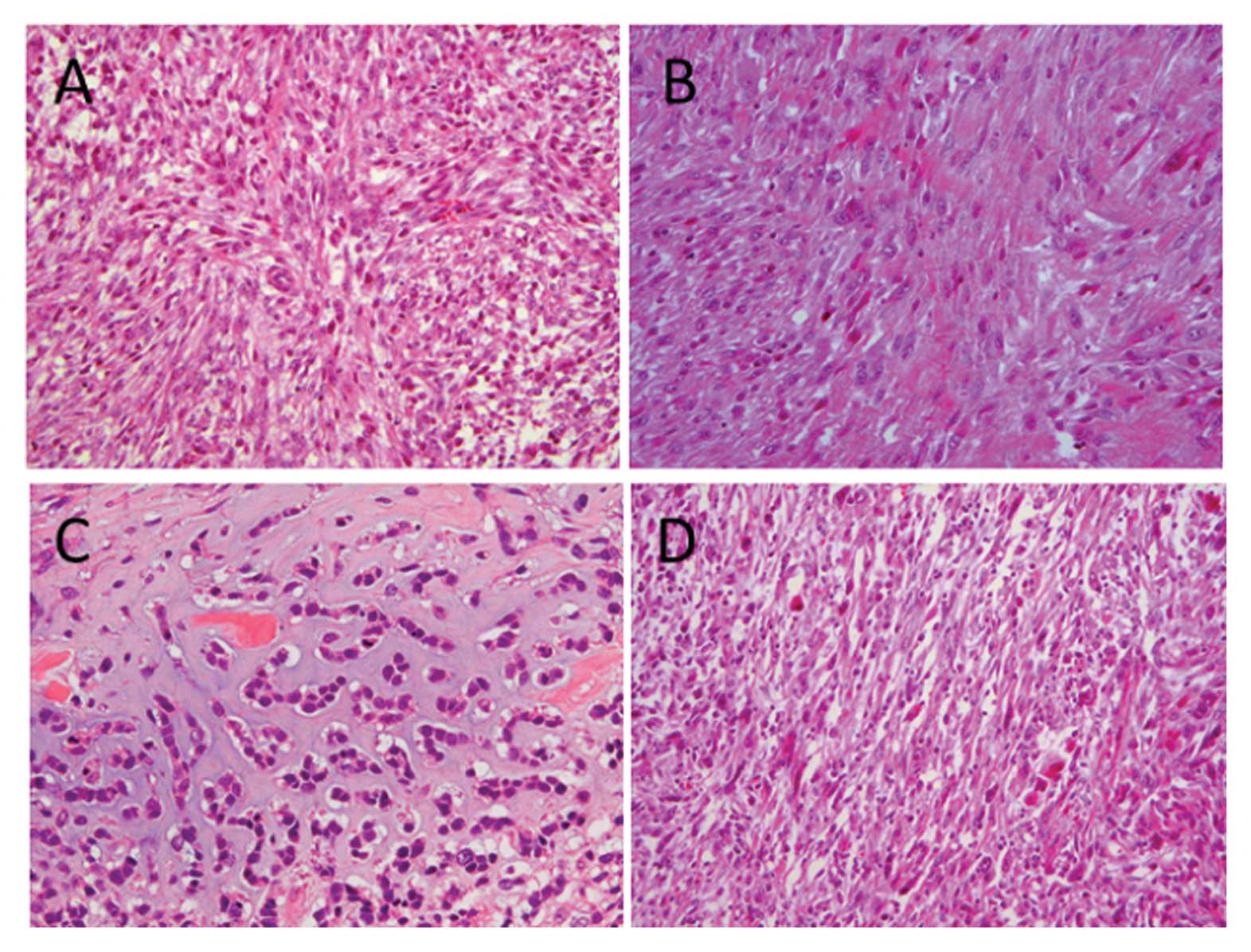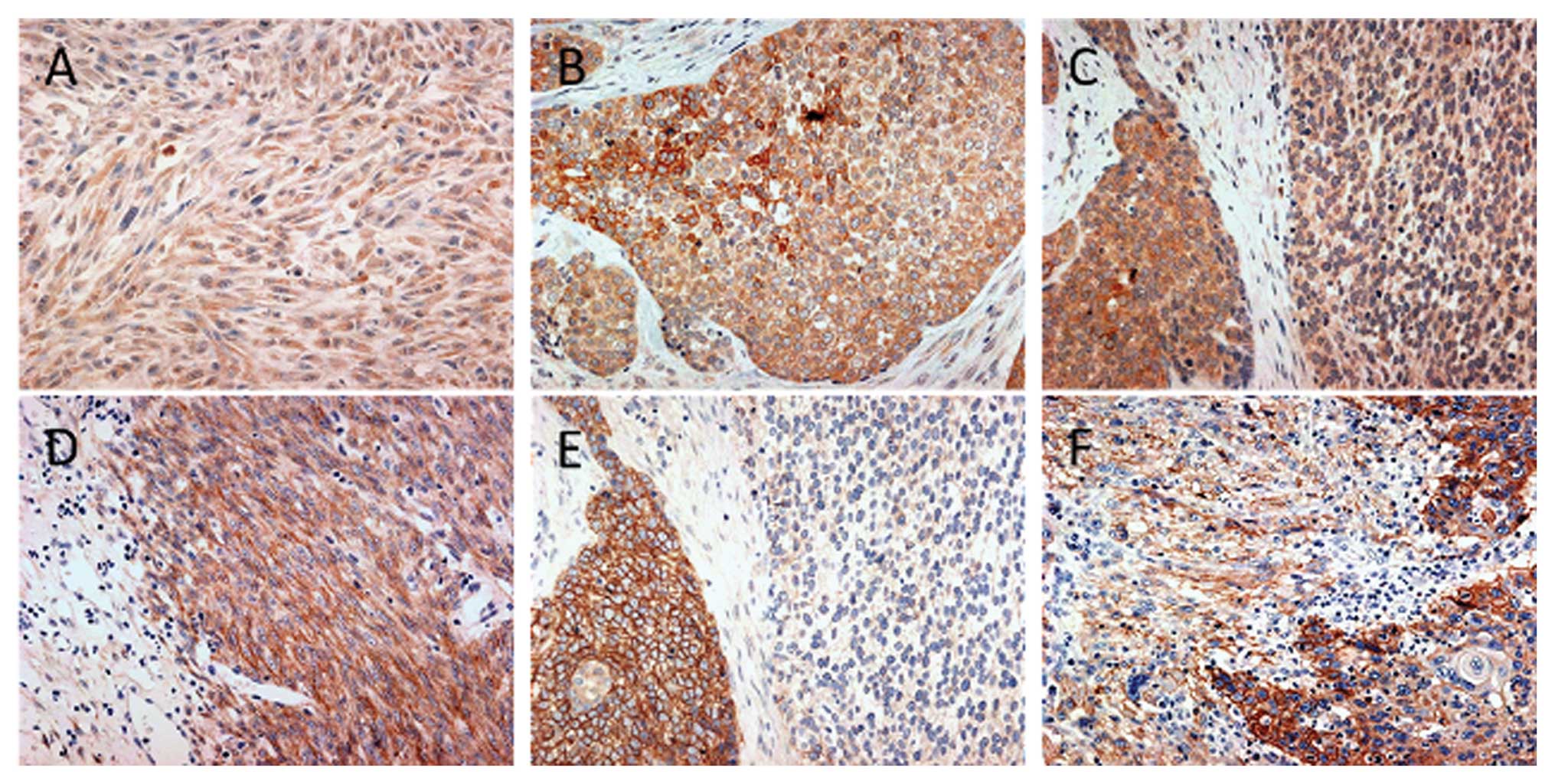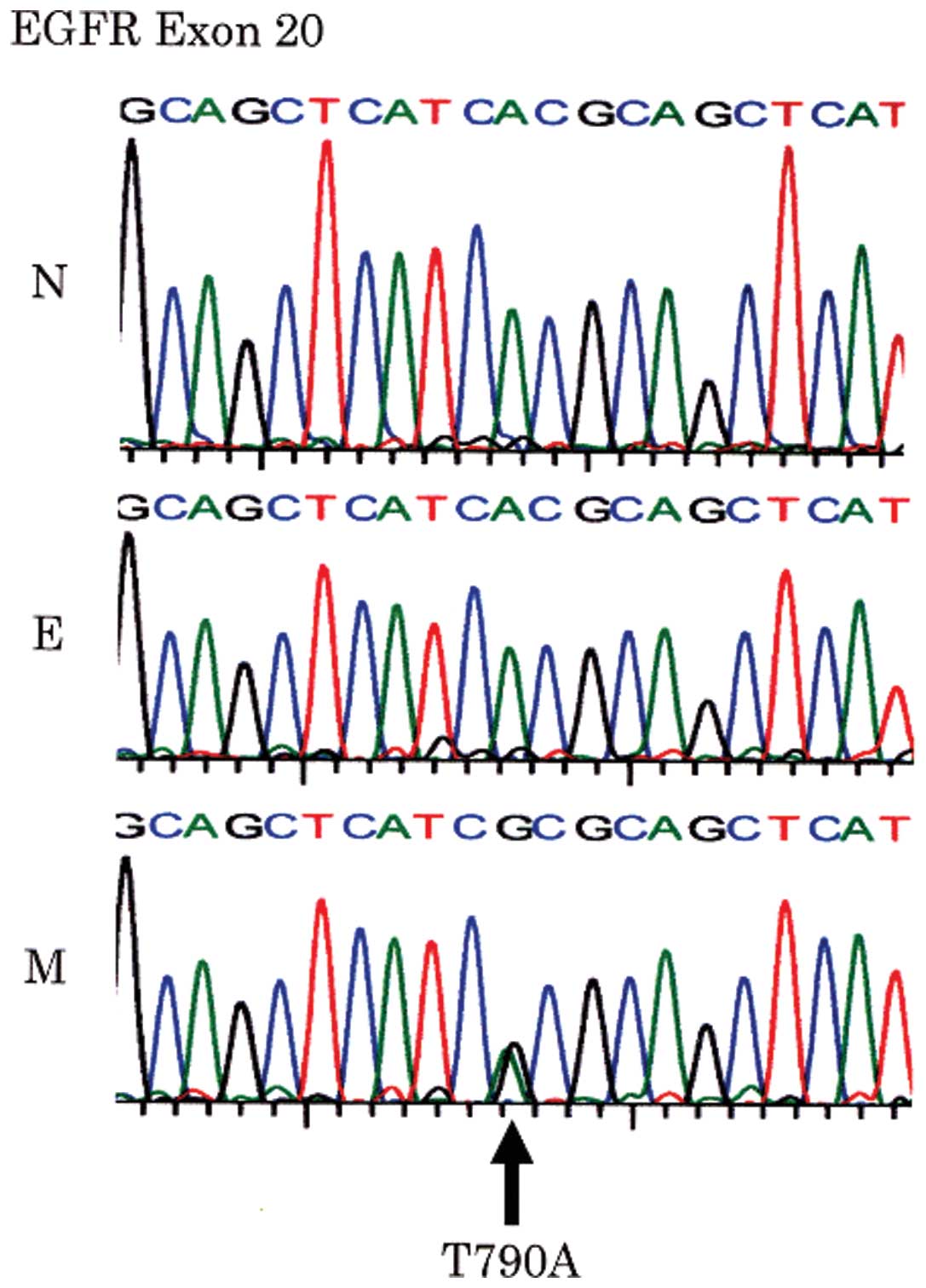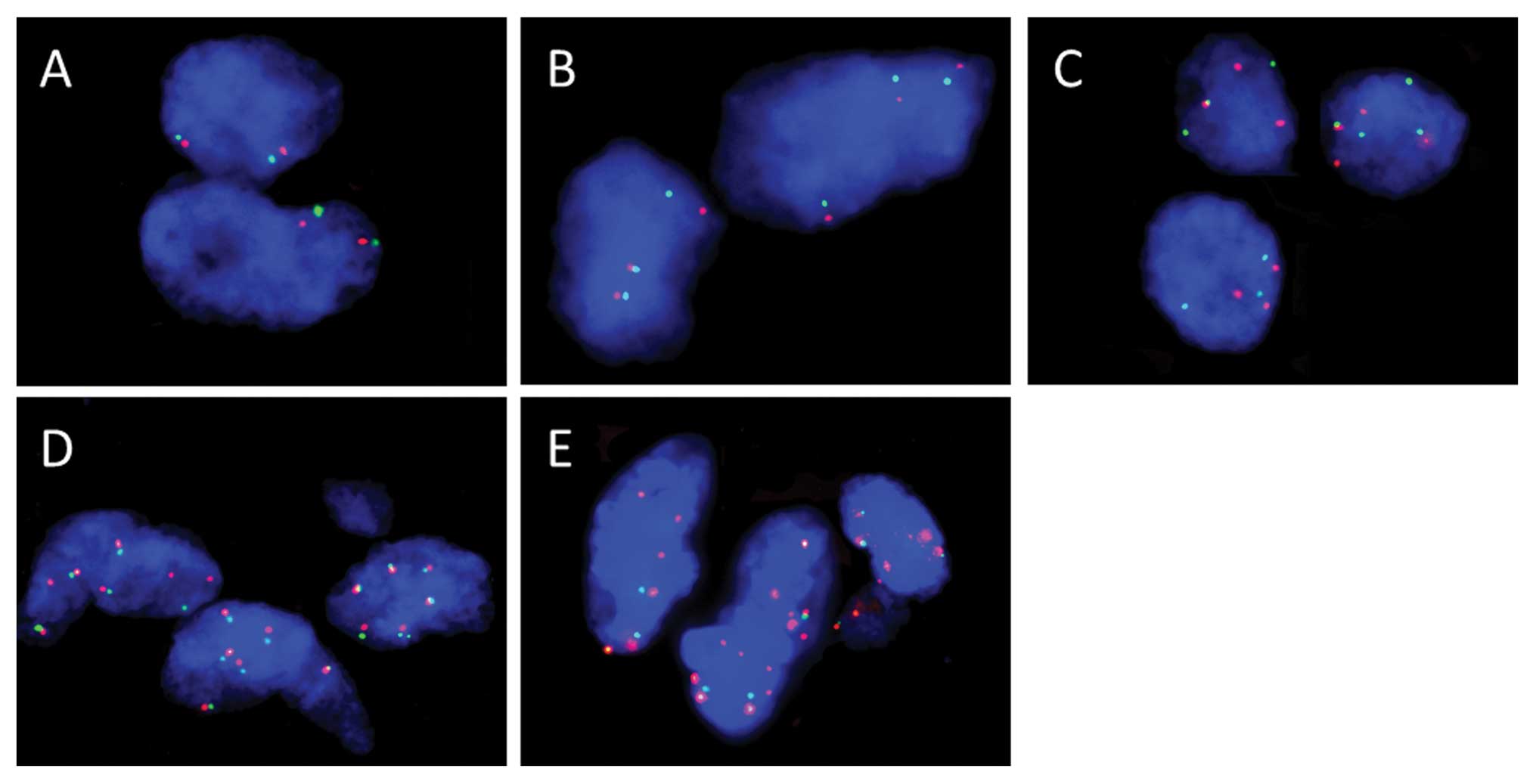|
1
|
Gabbert HE, Shimoda T, Hainault P,
Nakamura Y, Field JK and Inoue H: Squamous cell carcinoma of the
esophagus. Tumors of the Digestive System. Hamilton SR and Aaltonen
LA: IARC Press; Lyon, France: pp. 11–19. 2000
|
|
2
|
Perez N, Castillo M, Santos Y, et al:
Carcinosarcoma of the prostate: two cases with distinctive
morphologic and immunohistochemical findings. Virchows Arch.
446:511–516. 2005. View Article : Google Scholar : PubMed/NCBI
|
|
3
|
Cimbaluk D, Rotmensch J, Scudiere J, Gown
A and Bitterman P: Uterine carcinosarcoma: immunohistochemical
studies on tissue microarrays with focus on potential therapeutic
targets. Gynecol Oncol. 105:138–144. 2007. View Article : Google Scholar
|
|
4
|
Esses KM, Hagmaier RM, Blanchard SA,
Lazarchick JJ and Riker AI: Carcinosarcoma of the breast: two case
reports and review of the literature. Cases J. 2:152009. View Article : Google Scholar : PubMed/NCBI
|
|
5
|
Iyomasa S, Kato H, Tachimori Y, Watanabe
H, Yamaguchi H and Itabashi M: Carcinosarcoma of the esophagus: a
twenty-case study. Jpn J Clin Oncol. 20:99–106. 1990.PubMed/NCBI
|
|
6
|
Kuhajda FP, Sun TT and Mendelsohn G:
Polypoid squamous carcinoma of the esophagus. A case report with
immunostaining for keratin. Am J Surg Pathol. 7:495–499. 1983.
View Article : Google Scholar : PubMed/NCBI
|
|
7
|
Wang ZY, Itabashi M, Hirota T, Watanabe H
and Kato H: Immunohistochemical study of the histogenesis of
esophageal carcinosarcoma. Jpn J Clin Oncol. 22:377–386.
1992.PubMed/NCBI
|
|
8
|
Ziauddin MF, Rodriguez HE, Quiros ED,
Connolly MM and Podbielski FJ: Carcinosarcoma of the esophagus -
pattern of recurrence. Dig Surg. 18:216–218. 2001. View Article : Google Scholar : PubMed/NCBI
|
|
9
|
Iwaya T, Maesawa C, Uesugi N, et al: True
carcinosarcoma of the esophagus. Dis Esophagus. 19:48–52. 2006.
View Article : Google Scholar
|
|
10
|
Iascone C and Barreca M: Carcinosarcoma
and pseudosarcoma of the esophagus: two names, one disease -
comprehensive review of the literature. World J Surg. 23:153–157.
1999. View Article : Google Scholar : PubMed/NCBI
|
|
11
|
Kawano S, Kusunoki R, Aimi M, et al: A
case of carcinosarcoma of the esophagus treated by
chemoradiotherapy. Nippon Shokakibyo Gakkai Zasshi. 104:535–541.
2007.(In Japanese).
|
|
12
|
Donato Di Paola E and Nielsen OS; EORTC
Soft Tissue and Bone Sarcoma Group. The EORTC soft tissue and bone
sarcoma group. European Organisation for Research and Treatment of
Cancer. Eur J Cancer. 38(Suppl 4): S138–S141. 2002.
|
|
13
|
Campbell L, Blackhall F and Thatcher N:
Gefitinib for the treatment of non-small-cell lung cancer. Expert
Opin Pharmacother. 11:1343–1357. 2010. View Article : Google Scholar : PubMed/NCBI
|
|
14
|
Norum J, Nieder C and Kondo M: Sunitinib,
sorafenib, temsirolims or bevacizmab in the treatment of metastatic
renal cell carcinoma: a review of health economic evaluations. J
Chemother. 22:75–82. 2010. View Article : Google Scholar : PubMed/NCBI
|
|
15
|
Ferry DR, Anderson M, Beddard K, et al: A
phase II study of gefitinib monotherapy in advanced esophageal
adenocarcinoma: evidence of gene expression, cellular, and clinical
response. Clin Cancer Res. 13:5869–5875. 2007. View Article : Google Scholar : PubMed/NCBI
|
|
16
|
Sano A, Sakurai S, Kato H, et al:
Clinicopathological and immunohistochemical characteristics of
esophageal carcinosarcoma. Anticancer Res. 29:3375–3380.
2009.PubMed/NCBI
|
|
17
|
Saito K, Sakurai S, Sano T, et al:
Aberrant methylation status of known methylation-sensitive CpG
islands in gastrointestinal stromal tumors without any correlation
to the state of c-kit and PDGFRA gene mutations and their
malignancy. Cancer Sci. 99:253–259. 2008. View Article : Google Scholar
|
|
18
|
Cappuzzo F, Hirsch FR, Rossi E, et al:
Epidermal growth factor receptor gene and protein and gefitinib
sensitivity in non-small-cell lung cancer. J Natl Cancer Inst.
97:643–655. 2005. View Article : Google Scholar : PubMed/NCBI
|
|
19
|
Eder JP, Vande Woude GF, Boerner SA and
LoRusso PM: Novel therapeutic inhibitors of the c-Met
signaling pathway in cancer. Clin Cancer Res. 15:2207–2214. 2009.
View Article : Google Scholar : PubMed/NCBI
|
|
20
|
Jeffers M, Schmidt L, Nakaigawa N, et al:
Activating mutations for the met tyrosine kinase receptor in human
cancer. Proc Natl Acad Sci USA. 94:11445–11450. 1997. View Article : Google Scholar : PubMed/NCBI
|
|
21
|
Tuynman JB, Lagarde SM, Ten Kate FJ,
Richel DJ and van Lanschot JJ: Met expression is an independent
prognostic risk factor in patients with oesophageal adenocarcinoma.
Br J Cancer. 98:1102–1108. 2008. View Article : Google Scholar : PubMed/NCBI
|
|
22
|
Hu YC, Lam KY, Law S, Wong J and
Srivastava G: Profiling of differentially expressed cancer-related
genes in esophageal squamous cell carcinoma (ESCC) using human
cancer cDNA arrays: overexpression of oncogene MET correlates with
tumor differentiation in ESCC. Clin Cancer Res. 7:3519–3525.
2001.
|
|
23
|
Ren Y, Cao B, Law S, et al: Hepatocyte
growth factor promotes cancer cell migration and angiogenic factors
expression: a prognostic marker of human esophageal squamous cell
carcinomas. Clin Cancer Res. 11:6190–6197. 2005. View Article : Google Scholar
|
|
24
|
Kawaguchi Y, Kono K, Mimura K, et al:
Targeting EGFR and HER-2 with cetuximab- and trastuzumab-mediated
immunotherapy in oesophageal squamous cell carcinoma. Br J Cancer.
97:494–501. 2007. View Article : Google Scholar : PubMed/NCBI
|
|
25
|
Hanawa M, Suzuki S, Dobashi Y, et al: EGFR
protein overexpression and gene amplification in squamous cell
carcinomas of the esophagus. Int J Cancer. 118:1173–1180. 2006.
View Article : Google Scholar : PubMed/NCBI
|
|
26
|
Langer R, Von Rahden BH, Nahrig J, et al:
Prognostic significance of expression patterns of c-erbB-2, p53,
p16INK4A, p27KIP1, cyclin D1 and epidermal growth factor receptor
in oesophageal adenocarcinoma: a tissue microarray study. J Clin
Pathol. 59:631–634. 2006. View Article : Google Scholar
|
|
27
|
Rygiel AM, Milano F, Ten Kate FJ, et al:
Gains and amplifications of c-myc, EGFR, and 20.q13 loci in the no
dysplasia-dysplasia-adenocarcinoma sequence of Barrett’s esophagus.
Cancer Epidemiol Biomarkers Prev. 17:1380–1385. 2008.PubMed/NCBI
|
|
28
|
Bell DW, Gore I, Okimoto RA, et al:
Inherited susceptibility to lung cancer may be associated with the
T790M drug resistance mutation in EGFR. Nat Genet. 37:1315–1316.
2005. View
Article : Google Scholar : PubMed/NCBI
|
|
29
|
Lo HW, Hsu SC, Xia W, et al: Epidermal
growth factor receptor cooperates with signal transducer and
activator of transcription 3 to induce epithelial-mesenchymal
transition in cancer cells via up-regulation of TWIST gene
expression. Cancer Res. 67:9066–9076. 2007. View Article : Google Scholar
|
|
30
|
Lee MY, Chou CY, Tang MJ and Shen MR:
Epithelial-mesenchymal transition in cervical cancer: correlation
with tumor progression, epidermal growth factor receptor
overexpression, and snail up-regulation. Clin Cancer Res.
14:4743–4750. 2008. View Article : Google Scholar
|
|
31
|
Lu Z, Ghosh S, Wang Z and Hunter T:
Downregulation of caveolin-1 function by EGF leads to the loss of
E-cadherin, increased transcriptional activity of beta-catenin, and
enhanced tumor cell invasion. Cancer Cell. 4:499–515. 2003.
View Article : Google Scholar : PubMed/NCBI
|
|
32
|
Usami Y, Satake S, Nakayama F, et al:
Snail-associated epithelial-mesenchymal transition promotes
oesophageal squamous cell carcinoma motility and progression. J
Pathol. 215:330–339. 2008. View Article : Google Scholar
|
|
33
|
Ma PC, Maulik G, Christensen J and Salgia
R: c-Met: structure, functions and potential for therapeutic
inhibition. Cancer Metastasis Rev. 22:309–325. 2003. View Article : Google Scholar : PubMed/NCBI
|
|
34
|
Wang Z and Li SSC: Numb: A new player in
EMT. Cell Adh Migr. 4:176–179. 2010. View Article : Google Scholar : PubMed/NCBI
|
|
35
|
Grugan KD, Miller CG, Yao Y, et al:
Fibroblast-secreted hepatocyte growth factor plays a functional
role in esophageal squamous cell carcinoma invasion. Proc Natl Acad
Sci USA. 107:11026–11031. 2010. View Article : Google Scholar : PubMed/NCBI
|
|
36
|
Ilson DH: Esophageal cancer chemotherapy:
recent advances. Gastrointest Cancer Res. 2:85–92. 2008.
|
|
37
|
Janmaat ML, Gallegos-Ruiz MI, Rodriguez
JA, et al: Predictive factors for outcome in a phase II study of
gefitinib in second-line treatment of advanced esophageal cancer
patients. J Clin Oncol. 24:1612–1619. 2006. View Article : Google Scholar : PubMed/NCBI
|
|
38
|
Tew WP, Shah M, Schwartz G, et al: Phase
II trial of erlotinib for second line treatment in advanced
esophageal cancer. In: American Society of Clinical Oncology
Gastrointestinal Cancers Symposium; January 27–29, 2005; abs 5.
2005
|
|
39
|
Pinto C, Di Fabio F, Siena S, et al: Phase
II study of cetuximab in combination with FOLFIRI in patients with
untreated advanced gastric or gastroesophageal junction
adenocarcinoma (FOLCETUX study). Ann Oncol. 18:510–517. 2007.
View Article : Google Scholar : PubMed/NCBI
|


















